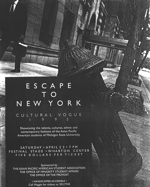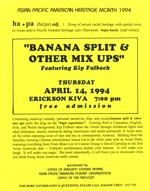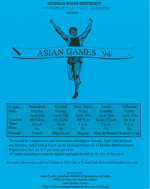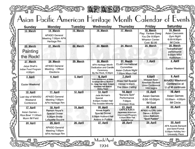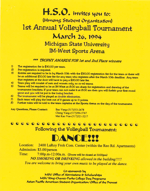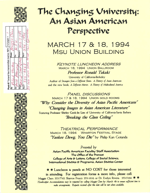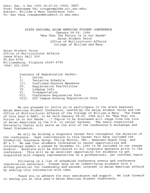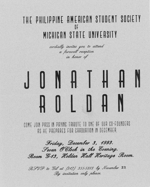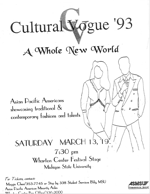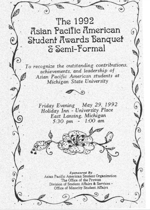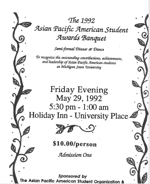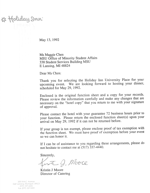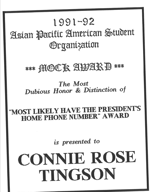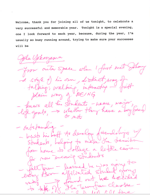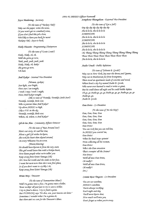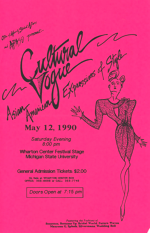Our Programming
This page showcases some of the ephemera and events hosted by Michigan State’s Asian Pacific American Studies Program and its affiliated organizations over the last twenty years. Before the establishment of APA Studies, APIDA/A organizations on campus would collaborate to host guest speakers and events, often with the support of willing academic departments or units. As the examples show, APA Studies has always been concerned with examining APIDA/A experiences within local, regional, and national contexts and across academic disciples. The presence of renowned activists like Grace Lee Boggs and Helen Zia on campus reflect the ongoing concerns students have had with activism and civil rights. At the same time, much of the work of APIDA/A student organizations also comments on how APIDA/A students have created belonging and a sense of place on campus by doing a variety of things such as performing comedy shows, holding sporting events, and hosting award ceremonies.
Please click on the thumbnails below to take a closer look!
This item details the arrangements made to bring three guest lecturers – Barbara Kim, Manu Meyer, and Grace Lee Boggs – to the university throughout 2001.
The following flyers were disseminated across campus to advertise both Helen Zia's and Grace Lee Boggs' guest lecture presentations at Michigan State between 2000 and 2001.
Here you can find copies of the receipts, reimbursement requests, and direct payment vouchers for Barbara Kim's 2001 guest lecture presentation.
Similarly, below you can find copies of Grace Lee Boggs' receipts, direct payment vouchers, and reimbursement forms for her 2001 guest lecture series.
Completing the set, below you can find copies of Manu Meyer's (then affilitated with the University of Hawai'i) receipts, direct payment vouchers, and reimbursement forms for her 2001 guest lecture series.
This flyer advertised Edward Park's and Martin Manalansan's guest lecture presentations at the MSU Student Union between April 23rd – 30th, 1999.
This flyer advertised the Wharton Center's 1995 Escape to New York: Cultural Vogue performance and fashion show. The event was co-sponsored by MSU's Asian Pacific American Student Association.
This flyer advertised 1994's Asian Pacific American Heritage Month featured event, "Banana Split & Other Mix Ups," featuring the comedic work of Kip Fulbeck.
This flyer advertised the 1994 Asian Games. These games were held from October 2nd – 16th, 1994 in Hiroshima, Japan. The theme of that years event, in line with its symbolic location, was the promotion of global peace and harmony.
This 1994 Asian Pacific American heritage month calendar of events provides just a glimpse of the diversity meant when we say APIDA/A.
This flyer and registration form advertising the Hmong Student Organization's 1st Annual Volleyball Tournament further shows the deep ties cultivated by the Asian Pacific American Student Organization (a co-sponsor of both the event and the ensuing dance).
This flyer, advertising the March 17th & 18th, 1994 "The Changing University: An Asian American Perspective" event – put on by the Asian Pacific American Faculty/Staff Association – highlights Professor Ronald Takaki's keynote address, a panel discussion on representation within Asian American literature, and a theatrical performance by Philip Kan Gotanda.
Here you can find a copy of the 6th Regional Asian American Student Conference registration packet from 1994. The topic of the conference was "Now that the Future is in Our Hands." Included in PDF is the conference invitation letter, a tentative schedule, confirmed keynote speakers, registration fee/policies, lodging information, transportation, conference registration form, and the off campus housing registration form.
This invitation from the Philippine American Student Society (PASS) of MSU was circulated to invite guests to a farewell reception in honor of Jonathan Roldan, a PASS co-founder.
This advert was for Cultural Vogue's 1993 show "A Whole New World". The Asian Pacific American fashion and talent show was hosted at the Wharton Center that year on March 13th & 19th, and saw Maggie Chen serve as point-person.
This flyer, advertising for the 1992 Asian Pacific American Student Awards Banquet and Semi-Formal, was circulated by the Asian Pacific American Student Association. The event itself took place on May 29th, 1992, and celebrated the contributions and successes of several of the university's APIDA/A community members.
This flyer and admission ticket (costing $10.00 per person) promoted the 1992 Asian Pacific American Student Awards Banquet. The event was held at the University Place Holiday Inn, and was directly sponsored by the Asian Pacific American Student Association.
This letter, along with some food receipts sent to Maggie Chen-Hernandez by the Director of Catering from Holiday Inn, provides some additional context into the arrangements reached for the above Awards Banquet.
Please peruse this slate of 'Mock Awards,' presented by the Asian Pacific American Student Organization for comedic effect at the end of the 1991-1992 academic year, to not only learn a little bit more about previous community members, but also their sense of humor.
In a similar vein, here you can find the mock award presented to Maggie Chen-Hernandez that year. The important and borderline institutional member of the community received the dubious distinction of being "most likely to have a nervous breakdown before she reaches 30."
This eight-page script, which includes both a typed speech and handwritten notes, was prepared by Maggie Chen-Hernandez at the 1992 Student Awards mentioned above. Unlike the mock awards, her words drip with gratitude, appreciation, and celebration for her fellow community members.
This curious set of song lyrics includes numerous alterations to incorporate APASO officers' names. These were drawn up as part of the "APASO Officers Farewell" portion of the 1992 Student Awards banquet.
The Office of Minority Student Affairs and APASO co-produced this advert for the 1990 Cultural Vogue: Asian American Expressions of Styles talent & fashion show. The event itself was held at the Wharton Center's Festival Stage on Saturday, May 12th, 1990.








